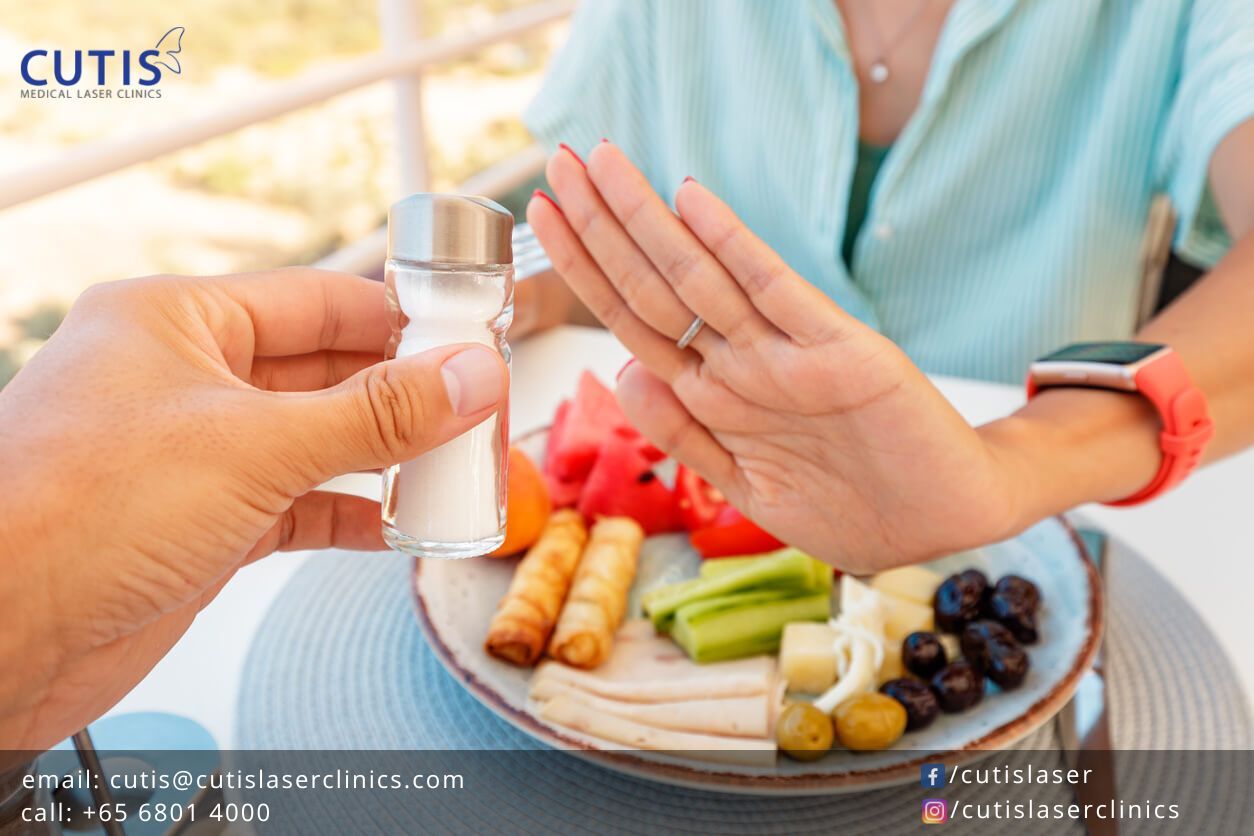
Salt makes almost any dish better. Apart from enhancing the taste of foods, this seasoning can also bring out aromas, balance other flavors, and preserve foods. The problem, however, comes with increased salt intake, which can have negative effects on your health and skin. In this article, we’ll be focusing on how excessive salt consumption (Salty Diet) does a number on your skin. As the skin can reflect what’s going on inside your body, it also means that eating too many salty diet can show up on your skin or face. Continue reading as we list down the things that can happen with your skin with a high salty diet.
Puffiness
Too much salt diet can cause your body to retain water, resulting in puffiness in your face and body. This can give your skin a bloated or plumped-up appearance. The area around the eye is susceptible to this effect due to its thin and delicate skin. Puffiness or under-eye bags can actually be a consequence of eating too much salt.
If you suddenly notice puffiness under your eyes, it only makes sense to examine your diet. If you’re eating too much salt, restoring the balance in your body can help with the bloating and restore your skin to normal. Using an eye cream, being gentle when applying products, and sleeping well are also important for younger-looking eyes and skin.
Dehydration
Excessive salt intake negatively affects the amount of water your internal organs absorb. This will then prompt the body to pull water from your cells and skin, resulting in dehydration. It could mean dry and flaky skin, with more prominent lines and wrinkles, as well as a lackluster appearance.
Another problem with dry skin is that it can trigger the overproduction of sebum. When there is excessive water loss, the skin protects itself by producing sebum or oil that covers the skin surface. This can make your skin look shiny and feel greasy, with the excess oil clogging your pores and triggering breakouts.
Aging and Salty Diet
As consuming excess salt can draw water out from the skin, your skin may become dry and more susceptible to wrinkling. Salty and deep-fried foods are specifically bad for the skin, as foods fried in oil at high temperatures release free radicals, which cause damage to the DNA and accelerate aging.
Studies, furthermore, suggested that a high salt diet is associated with telomere shortening. Basically, telomeres are the caps at the end of chromosomes, which help prevent damage in cells. Telomeres gradually shorten with time, but certain factors such as eating a high salt diet, smoking, lack of physical activity, stress, and obesity can hasten their shortening. Shorter telomeres have been associated with the aging process and an increased risk of diseases.
Acne/breakouts
This effect is related to the fact that too much salt can dehydrate your skin, which will then cause the body to overcompensate by producing more sebum. Excess oil can clog your pores and inflame your skin, resulting in blackheads/whiteheads and pimples. This can also worsen existing breakouts.
There have also been numerous studies suggesting a strong relationship between diet and acne. A case-controlled study published in the Wiley Library concluded that the consumption of salty foods is a possible participating factor in the onset of acne. This is because consumption of salty foods was significantly higher in patients with acne compared to those who are acne-free.
Mind your salty diet and salt consumption
Although it is true that too much salt is unhealthy, this doesn’t mean that you should skip it altogether. Salt is our diet’s main source of sodium and chloride ions. Sodium is an important electrolyte that can help maintain fluid balance in the body. It can also help regulate blood pressure and maintain nerve and muscle function.
What you should avoid is consuming too much of it. It’s fine to give in to some of your salty cravings occasionally, but don’t forget to drink lots of water. Instead of pairing a sugary beverage with a salty treat, wash it down with water to avoid dehydration.
You can also choose to cut back if you’re eating a high salt diet or if your doctor recommended you to do so. Strategies for scaling back include:
- Downsize your portions.
- Skip ketchup and other condiments packed with salt or choose low-sodium versions.
- Choose unprocessed or minimally unprocessed foods.
- Use a variety of herbs and spices (instead of adding extra salt) to add flavors to your dishes.
- Limit how much you order out.
How Cutis can help
If you’re noticing signs of aging and a dull-looking complexion, we can help. Our clinic offers a range of aesthetic treatments that can transform your skin without going under the knife. Below are a few procedures that can help improve your skin tone:
- Limelight Photo Facial – uses intense pulsed light technology to treat or improve brown spots and other types of hyperpigmentation. It can also help with facial redness and tiny veins, and be used on any part of the face, neck, and décolleté.
- Laser Genesis – is a US FDA-cleared laser treatment that can help stimulate collagen regrowth. It can promote healthy and vibrant skin by reducing/improving wrinkles, redness, scars, sun damage, and enlarged pores.
- Pearl and Pearl Fractional – are skin resurfacing procedures that can treat sun damage, wrinkles, and uneven skin texture. Pearl Fractional is a deeper technique that tackles severe sun damage and other signs of aging. Both can be combined in a procedure called Pearl Fusion.
- VI Peel – is a medical-grade chemical peel that removes the damaged layers and stimulates the production of new skin cells. VI Peel can improve the tone, texture, and clarity of your skin by reducing age spots and other pigmentation, softening lines and wrinkles, and improving acne marks and scars.
Don’t hesitate to contact Cutis Medical Laser Clinics Singapore if you need help treating imperfections or improving your skin. Get in touch with us today at +65 6801 4000 and schedule a consultation with our aesthetic doctor to learn which procedures or combination treatments are right for you.
- If you would like to be an informed patient, please contact us at +65-6801-4000 or
hello@cutislaserclinics.com. - Cutis Medical Laser Clinics, 9 Scotts Road Pacific Plaza, Scotts Medical Center #08-07, Singapore – 228210
+65-6801-4000 - hello@cutislaserclinics.com
